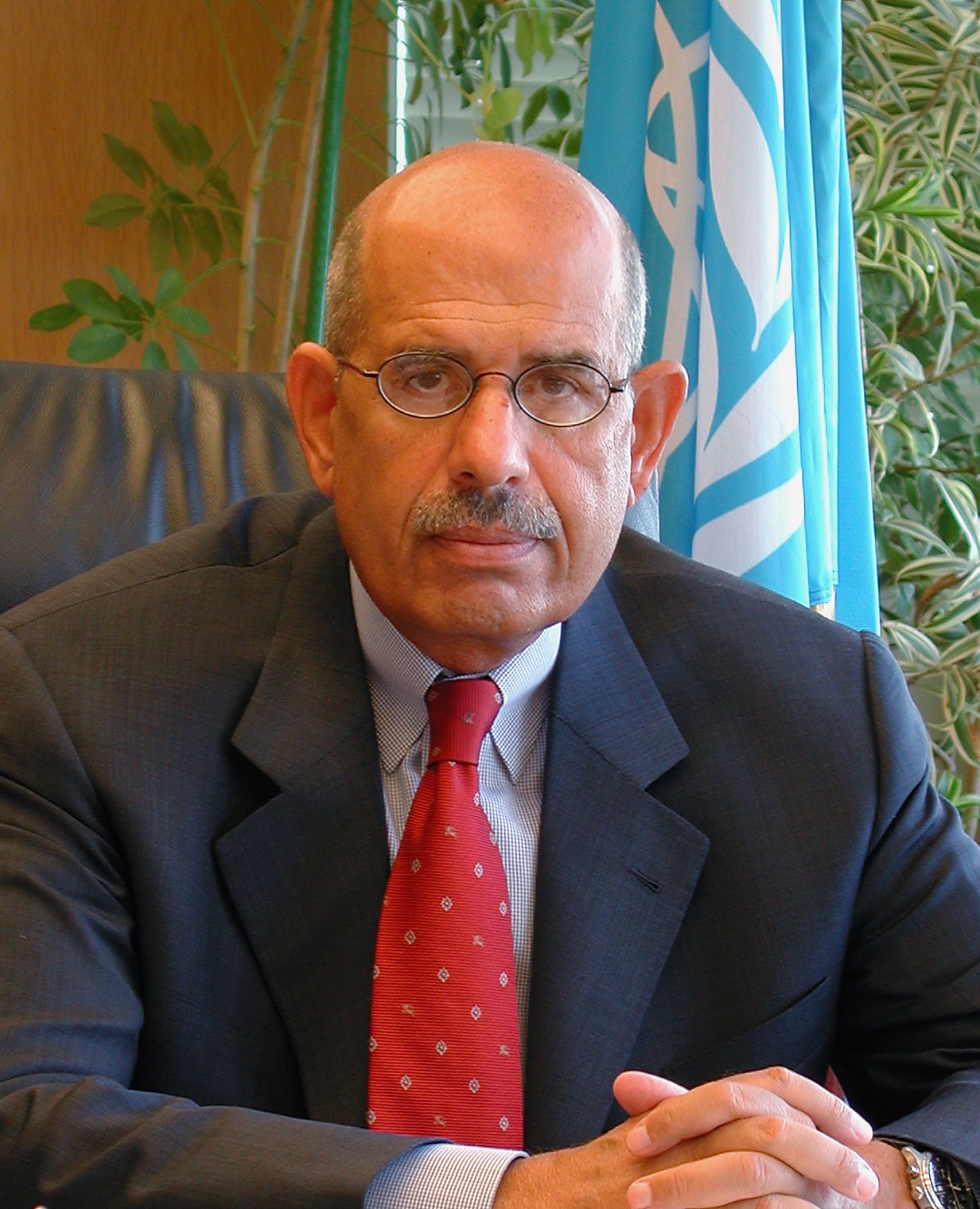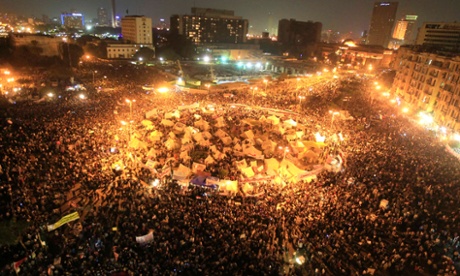Egypt postponed the start of early voting on a disputed draft constitution Friday, signaling an attempt by President Mohammed Morsi's government to back down and give room for negotiations with the opposition as it faces mass protests calling for the referendum to be canceled.
Hamdi said the weeklong voting by Egyptians abroad, which had been due to begin Saturday, will begin Wednesday instead
.
It was not immediately clear if the postponement was a concession or how that would affect the overall referendum timeline.
But Legal Affairs Minister Mohammed Mahsoub said the administration was weighing several proposals. He said those included calling off the referendum and returning the draft to the constituent assembly for changes or disbanding the whole constituent assembly and forming a new one, either by direct vote or upon an agreement among the political forces.
12/06/2012 BBC's Jon Leyne reports from Cairo
The Egyptian army has begun to clear demonstrators and media organisations from outside the presidential palace in Cairo.
A deadline of 13:00 GMT for protesters to leave the area was set.
Meanwhile, Egypt's top Islamic body has called on the president to suspend his decree claiming sweeping powers.
The Al-Azhar institution also demanded an unconditional dialogue between the president and his opponents.
The BBC's Jon Leyne in Cairo says this move by one of the most respected bodies in Sunni Islam has put President Morsi under more pressure.
But he adds that it is difficult to see what compromise is possible between President Morsi and the opposition.
The president - who is expected to address the
nation later on Thursday - adopted new powers in the decree on 22
November, and stripped the judiciary of any power to challenge his
decisions.
But there is also controversy over the proposed constitution. Critics say the draft was rushed through parliament without proper consultation and does not do enough to protect political and religious freedoms and the rights of women.
The government insists that a referendum on the draft constitution, drawn up by a body dominated by Morsi-supporting Islamists, will go ahead this month despite strong opposition.
Four of Mr Morsi's advisers resigned on Wednesday in an apparent protest. Three others did so last week and Mena news agency reported a further resignation on Thursday.
Tanks and armoured troop carriers were deployed outside the presidential palace on Thursday morning following the overnight clashes.
The head of Egypt's Republican Guard said the forces had been sent there to separate supporters and opponents of President Morsi.
Following a meeting between the president and military commanders, the 13:00 GMT deadline to clear the area round the palace was set. A ban on all protests in the area has also been ordered.
Our correspondent says the clashes between supporters and opponents of Egypt's new president are possibly the most dangerous development in Egypt's growing political crisis.
He says the violence, which opposition leaders accused Mr Morsi's Islamist Muslim Brotherhood movement of organising, was ominously reminiscent of the tactics used by former President Hosni Mubarak during the revolution.
Disorder was also reported in other cities, with Muslim Brotherhood offices attacked in Ismailia and Suez.
12/05/2012
Clashes continued Thursday outside the presidential palace in Egypt as supporters of President Mohammed Morsi and Freedom Fighters threw firebombs and pelted each other with rocks.
The protests have spread beyond Cairo; Opposition supporters reportedly set fire to the headquarters of the Muslim Brotherhood in the nearby city of Ismailia, witnesses told Reuters.
Thousands of Islamist supporters of Morsi descended on the area around the presidential palace where 300 protesters were staging a sit-in. The Islamists, members of Morsi's Muslim Brotherhood group, chased the protesters away from their base outside the palace's main gate and tore down their tents. The protesters scattered in side streets where they chanted anti-Morsi slogans.
After a lull in fighting, hundreds of young Morsi opponents arrived at the scene and immediately began throwing firebombs at the president's backers, who responded with rocks.
No casualties were immediately reported but witnesses said they saw several protesters with blood streaming down their faces. Medical sources said 23 people had been wounded, Reuters reports.
By nightfall, there were about 10,000 Islamists outside the palace. They set up metal barricades to keep traffic off a stretch of road that runs parallel to the palace in Cairo's upscale Heliopolis district. Some of them appeared to plan staging their own sit-in.
"May God protect Egypt and its president," read a banner hoisted on a truck that came with the Islamists. Atop, a man using a loudspeaker recited verses from the Koran.
Tensions were mounting between the two sides as opposition supporters vowed to continue protests while the Muslim Brotherhood called for a rally of its own.
Protests turned violent Tuesday as police fired tear gas to stop protesters approaching the palace in the capital's Heliopolis district. Morsi was in the palace conducting business as usual while the protesters gathered outside. But he left for home through a back door when the crowds "grew bigger," according to a presidential official who spoke on condition of anonymity because he was not authorized to speak to the media.
The official said Morsi left on the advice of security officials at the palace and to head off "possible dangers" and to calm protesters. Morsi's spokesman, however, said the president left the palace at the end of his work schedule through the door he routinely uses.
Protesters gathered as tensions grew over Morsi's seizure of nearly unrestricted powers and a draft constitution hurriedly adopted by his allies.
Many in the crowd were chanting "erhal, erhal," Arabic for "leave, leave" and "the people want to topple the regime" -- two well-known chants from the 2010-2011 Arab Spring revolts that toppled Mubarak and other Middle Eastern and North African rulers.
The protests were dubbed "The Last Warning" by organizers amid rising anger over the draft charter and decrees issued by Morsi giving himself sweeping powers that placed him above judicial oversight. Morsi called for a nationwide referendum on the draft constitution on Dec. 15.
It is Egypt's worst political crisis since the ouster nearly two years ago of authoritarian president Hosni Mubarak. The country has been divided into two camps: Morsi and the Brotherhood, as well as ultraconservative Salafi Islamists, versus youth groups, liberal parties and large sectors of the public.
Morsi's Nov. 22 decrees placed him above oversight of any kind, including the courts. The constitutional panel then rushed through a draft constitution without the participation of representatives of liberals and Christians. Only four women, all Islamists, attended the marathon, all-night session.
The charter has been criticized for not protecting the rights of women and minority groups, and many journalists see it as restricting freedom of expression. Critics also say it empowers Islamic religious clerics by giving them a say over legislation, while some articles were seen as tailored to get rid of Islamists' enemies.
Information from Fox News: Gathered from The Associated Press and Reuters
***ORIGINAL POST***
 |
| Pharaoh Mohamed Morsi |
NO
DAYLIGHT
BETWEEN
PHARAOH
AND ME
In
what seemed to be deja vu, Egyptian President Mohamed Morsi followed
the lead of fascist rulers of the last century and like the pharaohs in
ancient times has decreed across the land his usurpation of power.
The
decrees, codified under the guise of emergency law, give him the power
to use any force or steps necessary against what he perceives to be
“any threat to the revolution, national unity and safety or anything
that obstructs the work of state institutions.”
Amr Hamzawy |
“An absolute presidential tyranny. Egypt is facing a
horrifying coup against legitimacy and the rule of law and a
complete assassination of the democratic transition.”
- Amr Hamzawy, a member of
the dissolved Parliament
As
typical, the excuses for the inexcusable abound, such as Mubarek people
remain
in the judiciary or claiming that the political process is stalled.
Morsi already dissolved Parliament and has filled most local offices and
the military with members of the Brotherhood. He also took control of
all the media in previous actions.
 |
| Mohamed El Baradei |
“A major blow to the revolution that could have dire consequences.”
- Mohamed El Baradei, Nobel peace laureate
Pro-reform leader Mohamed El Baradei addressed a news conference along with other prominent politicians agreeing to do every thing possible to force Morsi to rescind his new powers. “We will work together as Egyptians until we achieve the goals of our revolution,” said El Baradei.
At this time Egyptians have returned to the streets protesting and burning Brotherhood offices. The Judiciary has called for strikes across Egypt, apparently the revolution is not over. Many Egyptians feel Mubarek was merely replaced by Morsi.
ARAB SUMMER
The Arab Spring, a phrase routinely used by media outlets friendly to the Obama Administration, has now returned to the Arab Summer where the drought of freedom persists as one dictator was merely replaced by another.
The Obama Administration issued a tepid response to the new dictatorship, one that shows its continued lack of leadership and inability to support those that hunger for the same freedom our forefathers fought and died for.
The hope of millions of Egyptians for a truly democratic country is still alive--waiting-- waiting for true leadership to unite them against the same tyranny that bares a new face.
UPDATE: 11/27/2012
 |
| Hamdeen Sabahy |
Popular Current, a group that is opposed to Morsi's power grab, said Tuesday's protest would go on. "We asked for the cancellation of the decree and that did not happen," said Mona Amer, a spokesperson for the group.
"Egypt will not accept a new
dictator because it
brought down the old one."
- Hamdeen Sabahy
The National Salvation Front, a new opposition coalition of Egyptian Patriots, have united against Morsi. The Front includes Sabahy, El Baradei and former Arab League chief Amr Moussa.
"There is no room for dialogue
when a dictator imposes the most
oppressive, abhorrent measures
and then says 'let us split the
difference'."
- Mohamed El Baradei
Morsi also ordered the retrial of Mubarak and top aides on charges of killing protesters during the uprising. He also created a new "protection of the revolution'' judicial body to swiftly carry out the prosecutions.
UPDATE:11/28/2012
 |
| Photograph: Mohamed Abdel |
"Today's
protests are to overthrow oppression and stand up to the new
dictatorship of Morsi, his decree and a constitution far removed from
the revolution. He has to back down. The revolution and the
streets will dictate what he will do. If he stands in the way of the
revolution he will share the same fate as Mubarak."
-Haytham Mohamedeen, Egyptian Revolutionary
Socialists
Total fatalities reached four on Tuesday, on the news of the death of Fathi Gharib, a member of the Socialist Popular Alliance.
 |
| Egyptians attend the funeral of Gaber Salah, who was killed Monday by security forces. (Photo: AP) |
The blows to freedom in the Middle East continue as Egypt's constituent assembly votes to keep "principles of sharia" as main source of legislation.




No comments:
Post a Comment